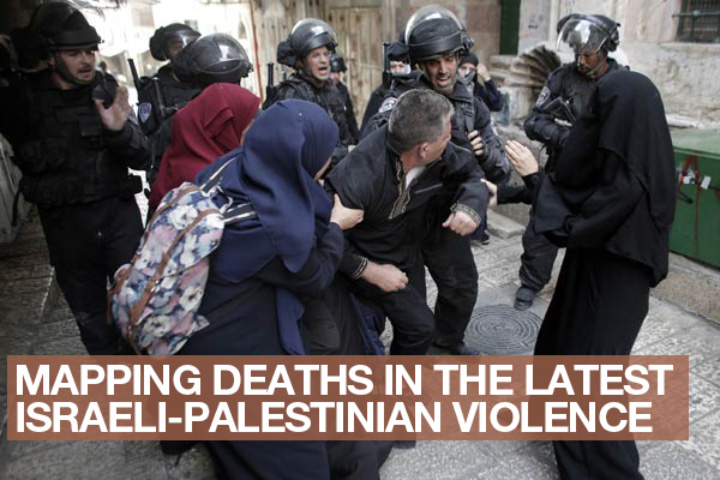Palestinian FM says Al-Aqsa surveillance ‘a new trap’
Unrest continues in West Bank after US said Israeli-Jordanian plan to install cameras inside mosque could calm tensions.

The Palestinian foreign minister has reacted warily to an agreement by Israel and Jordan to install more security cameras at Jerusalem’s flashpoint Al-Aqsa Mosque compound in a bid to defuse tensions.
US Secretary of State John Kerry, after meeting Palestinian President Mahmoud Abbas and Jordan’s King Abdullah II on Saturday, said Israel had embraced “an excellent suggestion” by the king for round-the-clock monitoring of Al-Aqsa.
Keep reading
list of 4 itemsIsrael blocks thousands of Palestinians from visiting Al-Aqsa Mosque
Israeli forces beat worshippers outside Al-Aqsa on Ramadan eve
Photos: Aftermath of the attacks on Israel in Ashkelon
But Palestinian Foreign Minister Riyad al-Maliki called the measure a “new trap”.
He told Voice of Palestine radio on Sunday that Israel was planning to use such footage to arrest Muslim worshippers it believes are “inciting” against it.
There was no immediate comment from Abbas.
Saeb Erekat, secretary-general of the Palestine Liberation Organisation, said Abbas had told Kerry “that he should look into the roots of the problem – and that is the continued occupation”.
Al-Aqsa Mosque, which is sacred to both Muslims and Jews, has been the focal point of the recent wave of violence in Israel and the occupied Palestinian territories.
Knife attacks, shootings and protests have become near-daily occurrences since October 1 in violence partially triggered by Israeli incursions at Al-Aqsa. At least 57 Palestinians and eight Israelis have been killed since the beginning of the month.
In a spate of incidents on Sunday in the West Bank, a 16-year-old Palestinian girl was shot dead after she allegedly attempted to stab Israeli border police. Palestinian witnesses disputed the police account.
Meanwhile, a Palestinian man was seriously wounded after being shot several times by an Israeli settler while picking olives, according to Palestinian security sources.
In another incident, near the city of Nablus, a Palestinian man stabbed and wounded an Israeli settler before fleeing, according to Israeli police.
‘In Israel’s interest’

Israeli Prime Minister Benjamin Netanyahu said the new measure at Al-Aqsa was taken to allay Palestinian fears that Israel was planning to change long-standing rules governing the site.
Netanyahu vowed that Jews would continue to be allowed to visit but not pray at the compound and agreed that 24-hour surveillance cameras could be installed, adding these were in Israel’s interest.
“Firstly, to refute the claim Israel is violating the status quo. Secondly, to show where the provocations are really coming from and prevent them in advance,” said Netanyahu.
Reporter’s Notebook: Al-Aqsa status quo at the heart of new violence
Currently, cameras film the outside plaza of the compound, but not the inside of holy monuments on the site, Defence Minister Moshe Yaalon said on public radio.
He said having cameras inside will allow the Jordanian Waqf, which administers the site, “to control things better”.
In 2013, Jordan and Abbas signed an agreement granting King Abdullah “custodianship of Jerusalem holy sites”. However, neither Jordan nor the Palestinian Authority has de facto control over the sites.
According to a 1994 peace treaty between Israel and Jordan, Israel “respects the special role of the Hashemite Kingdom of Jordan in Muslim holy shrines in Jerusalem”.
But the treaty stops short of giving Jordan any legal, political or religious authority over Islamic holy shrines in Jerusalem.
Kerry said Israel had also given assurances it had no intention of changing the status quo at the compound in occupied East Jerusalem, home to Al-Aqsa Mosque and another Islamic icon, the Dome of the Rock.
Jews perform religious rites at the Western Wall (Wailing Wall) of the Al-Aqsa Mosque compound, known as the Temple Mount in Judaism.